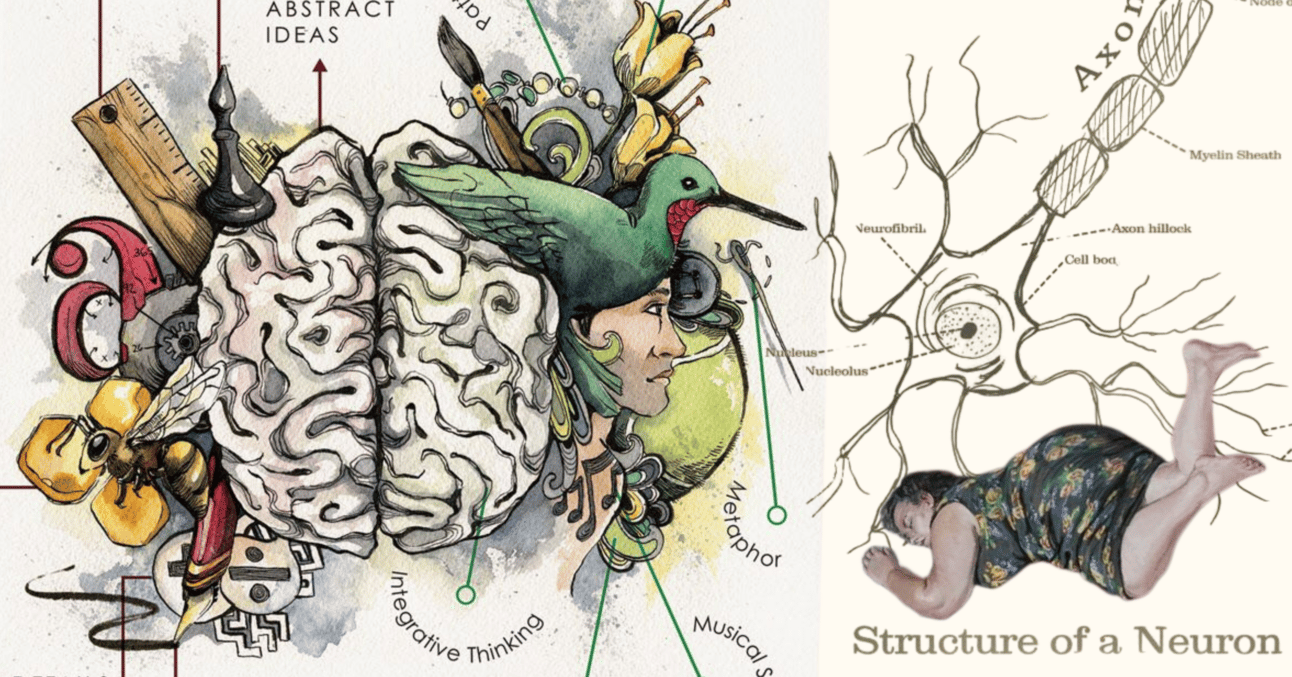How to Influence Who You Become—Using Neuroscience
On my bedside table sits a handwritten reminder: The brain takes the shape of what the mind rests upon.
This principle, rooted in Buddhism, is also the foundation of neuroplasticity: our thoughts alter the physical structure of the brain.
Say what?
Yup.
What you think and do repeatedly can literally influence the physical structure of the brain. The brain you're born with continues changing throughout your life.
When you learn something new, neurons (brain cells) form new connections. In some brain regions, your brain may even create new neurons through a process called neurogenesis.

From a vintage textbook called “Biology; the story of living thing.”
Remember Newton's third law of motion? For every action, there is an equal and opposite reaction?
Your brain operates on a zero-sum budget. When you get obsessed with piano, it doesn't just build new networks for finger coordination and musical processing—it starts pulling resources from the motor skills you're neglecting. Those pathways get weaker while the piano ones get stronger.
Neuroplasticity is your brain's constant rewiring project. It's always forming new connections and adapting to whatever you're doing most—learning, practicing, even recovering from injury. But it aso adapts and strengthens connection to your most recycled thoughts.
The mechanics: Neurons communicate through synapses, and repeated activity strengthens these connections. Scientists call this Hebbian plasticity—"neurons that fire together, wire together." Every time you practice something, you're literally reinforcing those neural networks.
But there's a catch—brains are efficient, not ambitious. They follow established pathways and shut down the unused ones. Left to their own devices, they'll take the path of least resistance every time.
The upside? We can direct this process through our choices. What we practice and choose to believe is what gets consistently reinforced.

Once we understand how these systems work, we can deliberately guide them—to reinforce habits, gradually shift thought patterns, and influence aspects of our behavior and identity over time.
For instance, I've been consistently practicing good sleep hygiene while telling myself I'm an excellent sleeper. And surprisingly? It seems to be working.
Today, I'll share a handful of principles from neuroscience that can help us work with our brain's natural adaptability—and influence who we become.
1. Your Brain is a Validation Machine for Your Unconscious Beliefs (And Couldn't Care Less About Your Conscious Goals)
Meet your Reticular Activating System—the RAS. Think of it as your brain's overzealous personal assistant whose only job is proving you right about everything you already believe.
Not what you want to believe.
What you actually believe, deep down.
Your unconscious beliefs run the RAS, baby. They're like standing orders followed with fervent religiosity: "Show me evidence that I'm forgettable," "Highlight every rejection," "Make sure I notice all the ways I don't belong."
So if you've been unconsciously convinced that you're always excluded, your RAS becomes tuned in. It’ll catalog each unreturned text, every party you weren't invited to, every slight—real or imagined. Meanwhile, it's completely blind to the times you were included because that doesn't match the brief.
Your conscious goals? Your RAS doesn't even know what those are.
Here's How to Work It:
First, realize your brain doesn't care if your beliefs are helpful or destructive. It just wants to be right. So we need to feed it different data.
Start collecting micro-evidence for what you actually want to believe. Want to feel capable? Document the tiny wins: you made your bed, remembered someone's birthday, figured out that annoying Excel formula. Your brain trusts evidence over affirmations.
Do this during dead time—walking, driving, waiting in line. Use those idle moments to actively hunt for proof of your new belief instead of letting your brain default to its old greatest hits playlist. It’s similar to looking for Glimmers.
The key is repetition. Beliefs don't change through understanding—they change through practice. You have to deliberately train your RAS to notice different things, over and over, until it becomes automatic.
Your brain will believe whatever you consistently show it. So start showing it what you want it to see.
2. Why You Shut Down Before You Even Begin
You think you're lazy because you fold before following through on going to the gym.
You think you're lazy because you turn on the TV instead of working on your novel.
This isn't laziness. It's your habenula.
The habenula is your brain's "anti-reward" center—a tiny cluster of neurons that acts like an overprotective parent, shutting down motivation before you even start. Its job is simple: scan for potential failure and shut you down before you experience disappointment. It's not malicious—it's trying to protect you from emotional pain. But it operates on the premise that avoiding failure is more important than achieving success.

Alicia Czechowski
The kicker? It doesn't shut you down after you fail. It shuts you down before you even try.
This is why you don't apply for the job you actually want. Why you delay pitching your project. Why you don't respond to the email. It's not that you don't care. It's that your brain is trying to protect you from future embarrassment by quitting early.
What an absolute asshole.
How to Deal With This
The habenula feeds on vague dread. Specific predictions rob it of its mysterious power and move the threat from "emotional" to "practical"—something you can actually address.
So get specific: "I'm afraid they'll reject my project." "I worry they'll ignore me."
Don't Start.
The habenula triggers on "starting" but not on "continuing." So instead of prepping to "start," prep to continue. You don't want to start writing a novel. You want to continue writing your novel (yes, even if you haven’t “started”).
Since the habenula is obsessed with preventing failure, plan for it explicitly.
Before doing anything, ask and answer:
"What's the worst realistic outcome?"
"How would I handle that?"
"What would I learn if this doesn't go perfectly?"
"How can I make this easily recoverable?"
Example failure plan: "If my presentation goes badly, I'll learn what doesn't work, thank people for their feedback, and use this information to improve next time. The worst case is temporary embarrassment, which I've survived before."
Dopamine quiets the habenula, so feed it small micro-doses. Take lots of small actions: make your bed, write the subject line of the email, put out your clothes for the gym, pull out the research folder to look through later.
3. Want People to Like You? Work With Their Mirror Neurons
You know how someone walks into a room and suddenly everyone's tense for no reason? Or how some people make you feel calm just by existing?
That's mirror neurons. You're literally syncing with each other's nervous systems.
Your nervous system is constantly teaching other people how to feel around you. Anxiety is contagious. But so is calm. So is confidence. So is genuine ease.
Most people are walking around slightly activated (👋🏼)—scanning for threats (👋🏼), managing low-level stress (👋🏼), defending against imaginary attacks (👋🏼).
When you show up genuinely regulated, you become a refuge. People don't just like you—they feel safer in your presence.
It's not manipulation. It's guidance. You're creating the emotional weather in the room.
So if you're trying to impress someone while radiating desperation or panic? That's what they're absorbing. You can say all the right things and still kill the vibe.
How to Work With This?
First, regulate your nervous system.
Breathe slower than feels normal.
Lower your voice a half-step.
Loosen your jaw.
People feel it. Their mirror neurons copy your calm.
Then, sync your rhythm with theirs. Match their tempo. Talk like you're already in conversation. Nod when they do. Smile when they smile. Mirror posture, subtly. Let them feel sameness before you lead.
Why this works: When brains sync, the other person's mirror neurons start firing in rhythm with yours. Their brain starts predicting what you'll say next and preparing to agree with it.
People feel it. And they calm down. And suddenly they're like, "I don't know why, but I really trust you."
4. Your Default Mode Network: Your Brain's Narrator
There's a narrator in your head who never stops talking (“No shit,” I hear you saying).
It runs during every idle moment—walking to the coffee shop, waiting for the elevator, lying in bed before sleep.
This is your Default Mode Network. It integrates and broadcasts memory, language, and semantic representations to create a coherent "internal narrative" reflecting your individual experiences.
Most people think mind-wandering is just mental noise. But your DMN is actually your brain's most important storyteller. It's constantly weaving together memories, imagining futures, and deciding what kind of person you are.
The problem: The DMN is active during passive rest and mind-wandering, which usually involves thinking about others, thinking about yourself, remembering the past, and envisioning the future. If you're not paying attention, it defaults to whatever story is loudest—usually anxiety, regret, or worst-case scenarios.
How to Work With It

Cannot find artist. Do you know?
Catch your background story. During waiting moments, what story is running? Is it rehearsing problems, replaying failures, imagining disasters? Your DMN is essentially practicing thoughts, making them more automatic.
Redirect the show. Instead of reaching for your phone to distract yourself, let your mind wander toward scenarios where you're capable, confident, successful. You're literally conditioning what feels "normal" to think about yourself.
Relaxation techniques, mindfulness, meditation, and even deep breathing can quiet the default mode network. But you can also guide what it processes during natural mind-wandering time.
Here’s the thing: Your sense of self isn't fixed—it's a DMN construction project that's constantly updating. Most people let this happen unconsciously, reinforcing whatever narrative is loudest.
But once you understand that your identity is partly built during these "empty" moments, you can become intentional about who and how you want to be.
Your brain is going to tell itself a story anyway. You might as well give yourself the best part.
Your Brain Wants You to Win
It just needs you to stop giving it mixed messages.
Your RAS will find whatever you've trained it to look for. Your habenula will protect you from imaginary failures. Your mirror neurons will broadcast whatever state you're in. Your default mode network will rehearse whatever story you feed it.
These systems aren't broken. They're not working against you. They're just following the instructions you've been unconsciously giving them for years.
Want love? Signal openness, not desperation. Want opportunity? Signal readiness, not scarcity. Want momentum? Start small and finish things. Want connection? Regulate first, then sync. Want a better future? Give your mind better stories to practice.
While this sounds like manifesting, it's actually neuroscience.
The universe isn't tilting in your direction because you're special. It's tilting because you finally learned how to work with the machinery you've had all along.
And now you know.
Until next week, I will remain…

Amanda
Today in psychological history: On June 25, 1975
The U.S. Supreme Court ruled, in Moody v. Albemarle Paper Company, that inappropriate psychological testing had been used for the purpose of racial discrimination. The practice was declared unconstitutional and back pay was awarded to the plaintiffs.
P.S. Thank you for reading! This newsletter is my passion and livelihood; it thrives because of readers like you. If you've found solace, wisdom or insight here, please consider upgrading, and if you think a friend or family member could benefit, please feel free to share. Every bit helps, and I’m deeply grateful for your support. 💙
Quick note: Nope, I’m not a therapist—just someone who spent 25 years with undiagnosed panic disorder and 23 years in therapy. How to Live distills what I’ve learned through lived experience, therapy, and obsessive research—so you can skip the unnecessary suffering and better understand yourself.
Some links are affiliate links, meaning I earn a small commission at no extra cost to you. Every bit goes straight back into supporting this newsletter. Thank you!





 Upgrade
Upgrade